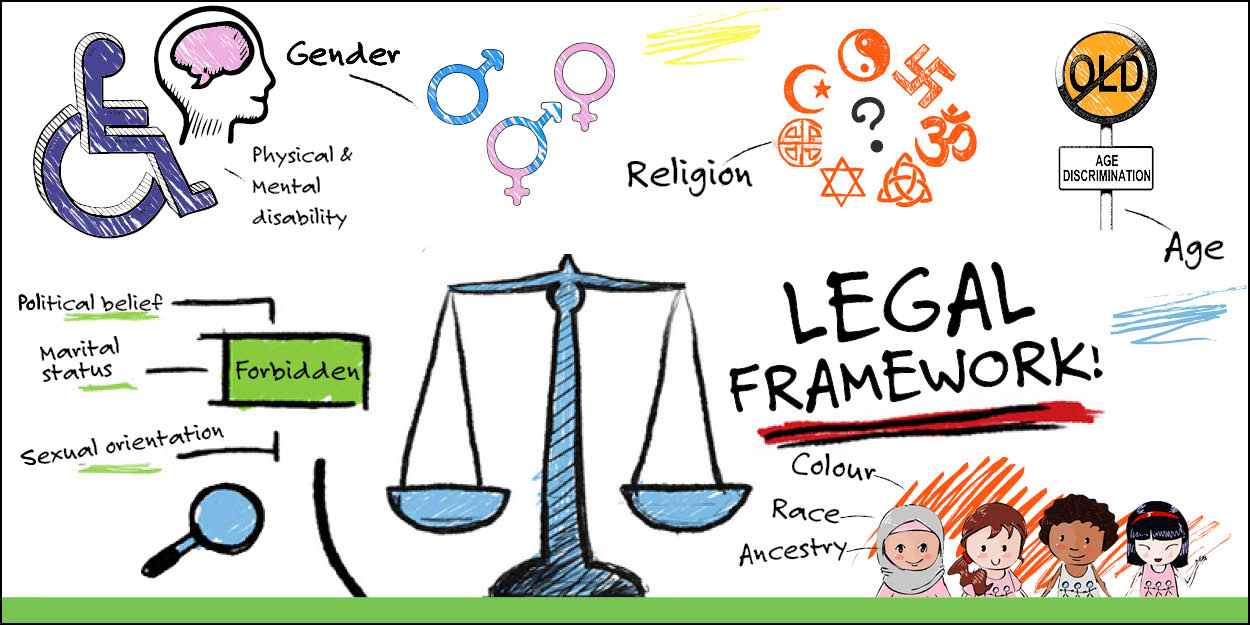
Recruiting is a necessary and an integral part of any business expansion efforts. Before starting the recruiting process, it is important to be aware of the legal framework within which you can function.
The risk of letting this slip through can be quite high. Job postings, interview questions, checking references and making job offers all need to be done in a way that meets legal requirements.
Check out Video Interviewing can Transform Your Hiring in this detailed blog post.
The most precarious part in recruiting is in the initial conversation with the candidates. You will not only lose the candidates, but will also land in a lawsuit. What more? All the efforts towards enhancing company’s employer brand will be a waste. The damage done to the brand will be so deep that you’ll need to triple your efforts.
What falls under unlawful questions?
"No person may unfairly discriminate, directly or indirectly against an employee in any employment policy or practice (from recruitment to exit) on one or more grounds, including race, gender, sex, pregnancy, marital status, family responsibility, ethnic or social origin, color, sexual orientation, age, disability, religion, HIV status, conscience, belief, political opinion, culture, language and birth." (excerpt) (mostly true for all countries)
This bit most employers know and they have trained their HR team to follow this. But the real problem lies where the line manager asks the recruiter to find out certain details that is specific to his or her need, which could land the company in trouble if they do not pay attention to how they ask the questions. Many times the inferences you are trying to arrive at can be gathered by totally innocuous questions and need not necessarily be arrived at by asking questions which are illegal to ask. We have put together a list of interviewing tips and questions, why they are illegal and alternative questions to get the relevant information from candidates.
Common Legal Alternatives To Illegal Interview Questions
1. How many children do you have? Are you pregnant? Do you plan on having children?
First, the American civil rights clearly say it is unlawful to deny a female applicant based because she has children. And that question is lawfully wrong on many grounds. It questions the applicant’s gender, the fact that the candidate has children or not, her marital status and child care arrangements. Second, this question has nothing to do with her availability to work. So steer clear of this question.
What to ask instead?
This is a shift-based job; will you be able to work late nights? If the work demands it, will you be able to work on weekends? This job might have an occasional irregular schedule; will you be able to meet this requirement?
2. What ailments do you suffer from? Are you on prescription drugs? How many sick leaves did you take in your last job?
The Americans with Disabilities Act ("ADA") prohibits employers from asking disability-related questions to applicants. Any question that elicits information regarding a disability can be considered unlawful. If your line managers require this information because the job needs heavy lifting or is stressful or emotionally strenuous. There are two ways to go about it.
What to ask instead?
This job requires frequent heavy lifting for most of the day. Are you able to do this? The kind of work we do can be physically/sometimes mentally draining; will you be able to do this on multiple occasions?
If you’d like to know further about his or her mental stability; employ assessments that analyses their stability without directly asking them.

3. When did you graduate from high school? How old are you? When is your birthday?
These violate the Age Discrimination in Employment Act; it shouldn’t matter the employer how old the candidate is. If it is the education criteria that you are looking for then there must be some degree of relationship between the level of education required for the position and the job duties of the position.
What to ask instead?
There is no apparent alternative to this, as age doesn’t matter the quality or availability of the candidate to work.
4. What country are your parents from? Are you a United States citizen?
Though Title VII doesn’t explicitly say you cannot ask someone’s nationality or place of origin. Workforce.com suggests in its article that, “inquiries that either directly or indirectly disclose such information, unless otherwise explained, may constitute evidence of discrimination prohibited by Title VII. Some state employment practice laws expressly prohibit inquiries on employment applications concerning the applicant's national origin. In some states, it may also be considered illegal to seek related data, such as the birth, place of birth or citizenship of parents, which could indirectly reveal national origin.”
It is best to avoid this question altogether. If you are required to know if he/she is eligible/legally allowed to work in The United States, then that must be made clear.
What to ask instead?
Are you eligible by the law to work in this country? Does your Visa permit you to work in here?
5. What is your native language?
Unless your job requires the candidate to know certain language, it is illegal to elicit this information. To find out about how eloquent s/he is; employ language proficiency test. You cannot ask how did the candidate acquire any foreign language unless it is a requirement for the role they have applied for. Even in that case you must ask for them to take a test.
What to ask instead?
Ask them to take the language proficiency test.
6. What church do you go to? What religion do you follow? What is your race?
There is no lawful job that would require you to inquire about the candidate’s race or religion. Unless yours is a religious institution where you can only employ a candidate that belongs to your religion or race. This extends to stopping you from asking of the candidate will be available on Fridays or Sundays or on festive occasions.
You can obtain information regarding race only for government record keeping requirements and this must not be common knowledge among other employees to avoid discrimination.
What to ask instead?
Like we mentioned before, there isn’t any reason under the law that requires you to ask their religion, race or color.
7. Do you have anyone in the office currently or in the past who may be your relative/friend/spouse?
There is no relevance between the candidate's competency and a friend or family member working in the office. This might come across giving preference or aversion to someone working in the office.
What to ask instead?
Workforce.com in its article says that, “As a general rule, however, unless an adverse effect on women or minorities can be shown, nepotism is not illegal.”
Checking References and the Work Around
It is not just the questions you ask during interview; it applies in any part of the recruitment process and during their employment. Current employers cannot ask all of the above mentioned questions during a background check, but they can ask the alternatives to them. Do not ask if the candidate took sick too many times or if marriage or relationship affected their performance.
What to ask instead?
If the candidate was reliable or punctual during his or her employment.
Making The offer
The law has made it clear that you cannot offer pay based on their gender, race or age. The wages must be based on the skills they possess, seniority pertaining to the job, or merit systems.
In all steps of the recruiting process (job postings, interviews, checking references and making the offer), you must be aware of the legal framework and the questions that you can and cannot ask the candidate. Doing so will minimize the risk and chance that you might be charged with discriminatory hiring practices. This will also ensure you have a positive reputation among the candidates. Remember that every interview you conduct leaves behind a brand ambassador. The process should be so seamless that every brand ambassador should leave wishing they would have the opportunity to work for you.
Always remember:
Don’t ask any questions that is not related to the job they are applying for. Be more careful what you ask female candidates as they are always on the receiving end of sexism, irrelevant and illegal questions. Relationship status, marital status; if they have children or not; if yes, how many. But if it is necessary for insurance, business or government keepsakes, then you can ask. You must be careful not to include these in the pre-employment interview or on the application form and these documents must not be revealed to other employees. Here’s a detailed article by Horwood Marcus & Berk regarding questions to avoid litigation, you may refer it. An easier way to handle interviews without landing into legal risk is by employing video interviews and other assessments that eliminates these risks. The legal framework pertaining to employing recorded video interviews goes like this.
According to the EEOC, “Under Title VII, it is not illegal for an employer to learn the race, gender or ethnicity of an individual prior to an interview. Of course, Title VII requires that all individuals be provided equal, nondiscriminatory treatment throughout the hiring process. If an employer representative observes a job seeker in a video clip, and either learns or surmises the person’s gender, race, or ethnicity, such knowledge could increase the risk of discrimination or the appearance of discrimination. Employers need to take care in training hiring officials and human resources staff about the appropriate responses when gender, race, or ethnicity are disclosed during recruitment. Video clips might be analogized to information on a resume that clearly tells an individual’s race, such as, ‘President, Black Law Students Association.’ In this situation, as with the video clip, the employer needs to focus on the person’s qualifications for the job.”

Leave a Reply